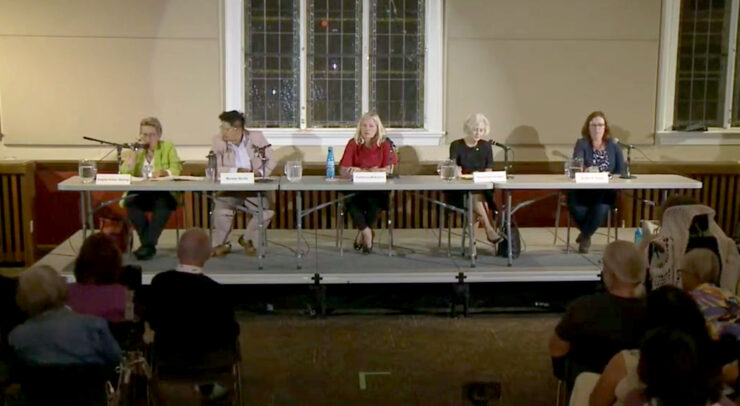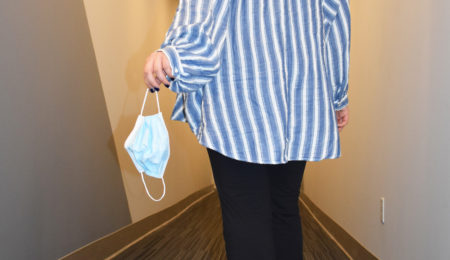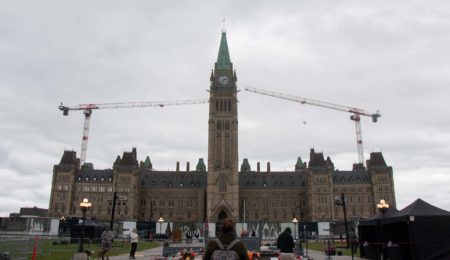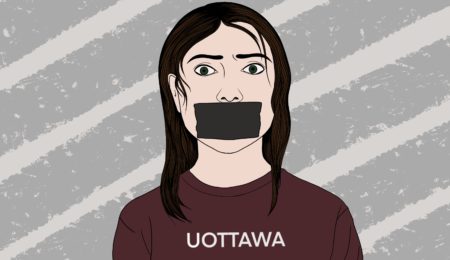Candidates talk climate change, Indigenous rights, opioid crisis, immigration
An all-female slate of candidates gathered in the Glebe Community Centre on Wednesday to debate policies in front of hundreds of Ottawa Centre constituents.
Historically, Ottawa Centre has been a left-wing riding, alternating between NDP and Liberal Members of Parliament since its creation in 1968 (with one exception of the Conservative win in the 1978 byelection). Catherine McKenna, the current Minister of Environment and Liberal candidate, won the election in 2015.
The five candidates did not hold back from taking aim at the party platforms of their opponents, while constituents filled the room with heckling and cheering.
Climate change
The centre of the debate was undoubtedly climate change. Conservative candidate Carol Clemenhagen promised her party will establish a mandatory emission standard and invest in technology to reduce carbon emissions more effectively.
She criticized McKenna for not being on good terms with provincial governments, to which McKenna replied: “Conservative (would) rather spend tax dollars to fight carbon tax in court than to address climate change.”
“I wish to god I can work with Conservative politicians rather than fighting them in court,” she added.
McKenna also spoke out about the controversial Trans Mountain Pipeline Extension.
“The pipeline is not increasing carbon emission but brings resources to the market,” she said, adding a good environmental policy has to also take jobs into consideration.
New Democratic Party candidate Emilie Taman said her party will end all fossil fuel subsidies and invest in free public transit.
“If our ideas don’t offend fossil fuel execs, billionaires and corporate developers, we are not acting with the urgency that this moment requires,” Taman said.
Green Party candidate Angela Keller-Herzog echoed the NDP’s policies, adding that her party plans to cut carbon emissions by 60 per cent by 2030.
People’s Party of Canada candidate Merylee Sevilla received loud boos from the audience as she openly claimed she did not believe in climate change.
“The world goes through cycles, just like Amazon’s having fires to help with the flow,” Sevilla said. She also criticized students who took part in the Global Climate Strike.
Indigenous rights
McKenna acknowledged that the Liberal Party needs to do more on Indigenous reconciliation.
NDP candidate Taman objected McKenna by pointing out millions of dollars being spent by the Trudeau government to fight Indigenous people in court.
She criticized the Conservatives and Liberals for platforms with underfunded education and health care systems for Indigenous communities, calling child welfare “a disgrace.”
Keller-Herzog agreed with Taman and said the Green Party will commit to the dismantling of the Indian Act.
PPC’s Sevilla pledged to invest foreign aid money to Indigenous communities instead, receiving applause from the audience.
Clemenhagen did not mention any specific plans regarding Indigenous rights but said the government should “acknowledge and look forward to the future.”
Immigration and refugees
Sevilla denounced birthright citizenship and mass immigration, adding the PPC will reduce the yearly inflow of immigrants to roughly 100,000. Sevilla said the party will prioritize skilled workers and stop accepting refugees.
NDP’s Taman whole-heartedly disagreed: “There is no such thing as mass immigration.” She mentioned the Safe Third Country Agreement and that Canada has an obligation to process asylum claims at the Canadian border.
Clemenhagen said the Conservative Party welcomes immigrants and refugees, but she proposed stricter border control for undocumented immigrants.
Green Party’s Keller-Herzog praised the Liberal government for supporting Syrian refugees. McKenna said the party should invest more on immigrations.
“My father was an immigrant,” McKenna said. “Immigrants do contribute to this country and that is important.”
Universal pharmacare
Clemenhagen disagreed with the idea of developing universal pharmacare.
“My concern … is that we’re setting ourselves up to have different elements in an already-stressed health system competing for economic resources,” she said, suggesting identifying gaps in care and giving subsidies to ensure everyone can access the medical system instead.
Taman outlined a reformed tax system to bring in enough money for universal pharmacare: “A wealth tax for people with more than $20 million in wealth.”
Keller-Herzog said the Green Party would introduce a corporate tax and transaction tax for the financial sector, which had been implemented in France.
Fiscal balance and affordability
Defending the Liberal government’s $14 billion deficit, McKenna listed her party’s accomplishments: “Canada’s GDP is the best among the G7 countries, we created one million jobs,” as well as childcare, affordable housing and investments in green infrastructure on the Ottawa River.
Keller-Herzog agreed but pointed out the Liberal’s $3.3-billion annual subsidies for fossil fuel production: “It’s not about never having deficits, but it’s about spending wisely,” she said.
Sevilla said the PPC promises to reduce tax: People earning between $50,000 to $100,000 will pay 15 per cent in tax, while people earning above $100,000 will pay a 25 per cent tax.
“Reducing tax, and affordable housing, that is our platform,” Sevilla said.
Clemenhagen stressed balancing the budget is the Conservative’s priority, while Taman repeated the NDP’s plan to have a tax system reform.
All four parties agreed that housing in Ottawa Centre is of the utmost importance. The land in LeBron Flats was mentioned as a starting point for boosting affordable housing.
Opioid crisis
Both Clemenhagenand McKenna did not specify if they would decriminalize illicit drugs but said their parties will focus on helping individuals.
McKenna took the example of the Ontario provincial government’s cuts to health care to argue the Conservatives should not be trusted. She framed the Liberal’s legalization of marijuana as a success.
Taman and Keller-Herzog loudly supported the decriminalization of illicit drugs, to which they received a loud cheer from the audience.
“I know it’s uncomfortable for a lot of people, but if we’re going to treat this as the health crisis that it is, that’s an absolutely necessary step,” Taman said.
“I see this as a mental health and poverty issue, not a criminal issue,” Kelly-Herzog said.
Sevilla disagreed, saying that decriminalization would not benefit anyone.





